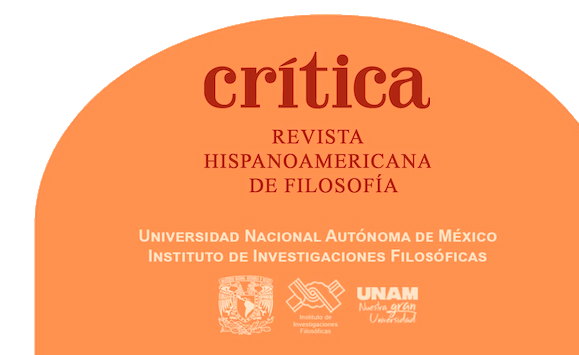Crítica - Reimagining Social Epistemology
Reimagining Social Epistemology:
Methodological Reassessments and Future Prospects
(Special Issue in memory of Alvin I. Goldman)
Editores invitados:
Ángeles Eraña (IIFs-UNAM) y Alejandro Vázquez del Mercado (FFyL-UNAM)
Desde la publicación de Knowledge in a Social World de Alvin Goldman (1999), la epistemología social ha experimentado crecimiento e innovación de manera notoria, consolidándose como un campo dinámico e influyente dentro de la investigación filosófica. Esta expansión ha sido impulsada por una abundancia de innovación teórica que ha permitido profundizar en la comprensión del conocimiento en contextos sociales.
En las últimas dos décadas, numerosos programas de investigación han llevado a la epistemología social en direcciones diversas y estimulantes. Estos incluyen, entre otros: la agregación de juicios (e.g. List y Pettit, 2002), la epistemología de las virtudes grupales (e.g. Kallestrup, 2020), la epistemología feminista situada (e.g. Grasswick y Webb, 2002), la cognición 4E (e.g. Catala et al., 2021), la epistemología de la atención (Pinedo y Villanueva, 2022), la epistemología socialmente extendida (e.g. Carter et al., 2018), la epistemología ambiental (Amico-Korby et al., 2024), la lógica epistémica (e.g. Baltag, 2018), la epistemología afectiva (Berninger, 2019), la sociología del conocimiento (e.g. Fuller, 2002), la injusticia epistémica (e.g. Origgi, 2022), la construcción de nichos cognitivos (e.g. Arfini et al., 2019) y la crítica a la ideología (e.g. Haslanger, 2021).
Estos enfoques han aportado nuevas perspectivas sobre preguntas clave en epistemología social, incorporando factores como la interacción entre agentes, el papel de los entornos materiales y la influencia de factores pragmáticos en los relatos epistemológicos.
Ante este panorama de diversidad e innovación, es oportuno realizar una reevaluación amplia de las metodologías que sustentan la investigación en epistemología social. Esta reflexión no sólo incentivará que el campo siga consolidándose, sino que además podrá abrir nuevas vías de exploración.
En memoria de Alvin Goldman y en reconocimiento a sus contribuciones fundamentales al campo, invitamos a enviar trabajos que aborden las siguientes preguntas:
- ¿Qué conceptos o metodologías emergentes podrían abordar lagunas en la investigación actual sobre epistemología social?
- ¿Qué nociones teóricas podrían ayudar a unificar, categorizar o establecer un diálogo entre los múltiples enfoques dentro de la epistemología social?
- ¿Qué supuestos ontológicos sobre individuos, grupos u otras entidades sociales subyacen a las teorías existentes en epistemología social?
- ¿Cuáles son las unidades de evaluación apropiadas al valorar el conocimiento dentro de la epistemología social?
- ¿Cómo puede expandirse la epistemología social para abordar mejor cuestiones de crítica y transformación social? ¿Cómo podría hablar de manera más directa a contextos subrepresentados, como aquellos pertenecientes al Sur Global?
Al considerar críticamente estas y otras preguntas afines, buscamos afinar las herramientas teóricas y metodológicas de la epistemología social, asegurando su relevancia e impacto continuos, tanto de manera filosófica como social.
Guía de envío
Los artículos no deben exceder las 10,000 palabras, excluyendo las referencias, y deben enviarse en formato PDF o Word a la siguiente dirección de correo electrónico: mael@filosoficas.unam.mx. Los envíos deben ajustarse a la guía de estilo de Crítica. Las contribuciones podrán estar escritas en inglés o en español. Las autoras y autores que deseen recibir retroalimentación sobre la pertinencia de una propuesta pueden ponerse en contacto con nosotros. La fecha límite de envío es el 1 de diciembre de 2026.
Es necesario enviar dos versiones electrónicas del manuscrito. La primera debe incluir el nombre los autores, el título de la contribución, dirección de correo electrónico y dirección postal (incluido el número de teléfono). La segunda versión debe estar preparada para dictaminación anónima, omitiendo todas las referencias al autor, incluidos agradecimientos y detalles bibliográficos. El archivo que contenga el artículo debe incluir el título, un resumen (máximo 100 palabras) y una lista de cinco palabras clave que no estén mencionadas en el título. De ser posible, el título, el resumen y las palabras clave deben proporcionarse tanto en español como en inglés.
Crítica. Revista Hispanoamericana de Filosofía es una publicación trimestral del Instituto de Investigaciones Filosóficas de la UNAM, en México. Para más información, favor de visitar
https://critica.filosoficas.unam.mx.
Referencias
Amico-Korby, D., Harrell, M., & Danks, D. (2024). Environmental epistemology. Synthese, 203(3), 81.
Arfini, S., Bertolotti, T., y Magnani, L. (2019). Online communities as virtual cognitive niches. Synthese, 196(1), 377-397.
Baltag, A., Boddy, R., y Smets, S. (2018). Group knowledge in interrogative epistemology. En H. van Ditmarsch y G. Sandu (Eds.), Jaakko Hintikka on knowledge and game-theoretical semantics (pp. 131–164). Springer.
Catala, A., Faucher, L., y Poirier, P. (2021). Autism, epistemic injustice, and epistemic disablement: A relational account of epistemic agency. Synthese, 199(3), 9013-9039.
Carter, J. A., Clark, A., Kallestrup, J., Palermos, S. O., y Pritchard, D. (Eds.). (2018). Socially extended epistemology. Oxford University Press.
Fuller, S. (2002). Social epistemology. Indiana University Press.
Goldman, A. I. (1999). Knowledge in a social world. Oxford University Press.
Grasswick, H. E., & Webb, M. O. (2002). Feminist epistemology as social epistemology. Social epistemology, 16(3), 185-196.
Haslanger, S. (2021). Political epistemology and social critique. Oxford studies in political philosophy, 7, 23-65.
Kallestrup, J. (2020). Group virtue epistemology. Synthese, 197, 5233-5251.
List, C., y Pettit, P. (2002). Aggregating sets of judgments: An impossibility result. Economics & Philosophy, 18(1), 89-110.
Origgi, G. (2012). Epistemic injustice and epistemic trust. Social Epistemology, 26(2), 221-235.
Pinedo, M. y Villanueva, N. (2022), Epistemic de-platforming. En D. B. Plou, V. F. Castro y J. R. Torices, eds., The Political Turn in Analytic Philosophy: Reflections on Social Injustice and Oppression. De Gruyter, pp. 105–134.

Aviso de privacidad




 Circuito Maestro Mario de la Cueva s/n, Ciudad Universitaria, C.P. 04510, Coyoacán México, CDMX
Circuito Maestro Mario de la Cueva s/n, Ciudad Universitaria, C.P. 04510, Coyoacán México, CDMX